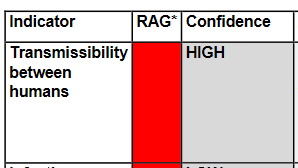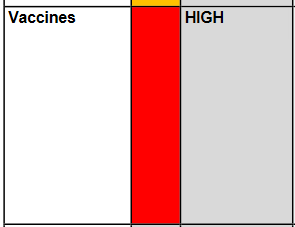
The PHE risk assessment of Delta/B.1.617.2/'India' has been updated today, 3 June.
- *new* INFECTION SEVERITY risk assessed as RED (with Iow confidence)
- VACCINES risk still assessed as RED but now with HIGH confidence.
Previous versions linked below.
A thread.
- *new* INFECTION SEVERITY risk assessed as RED (with Iow confidence)
- VACCINES risk still assessed as RED but now with HIGH confidence.
Previous versions linked below.
A thread.
https://twitter.com/Dr_D_Robertson/status/1397968530147008515

TRANSMISSIBILITY BETWEEN HUMANS
RED risk
HIGH confidence
"Transmissibility appears greater than wild type (first wave) SARS-CoV-2Delta continues to demonstrate a substantially increased growth rate compared to Alpha, across multiple analyses. ...
RED risk
HIGH confidence
"Transmissibility appears greater than wild type (first wave) SARS-CoV-2Delta continues to demonstrate a substantially increased growth rate compared to Alpha, across multiple analyses. ...

"... Delta cases are rising whilst Alpha cases are declining. Secondary attack rates, including household secondary attack rates, are higher for Delta, but these are not yet corrected for vaccination status. There is in vitro evidence suggestive of increased replication in ...
"biological systems that model human airway. It is highly likely that Delta is significantly more transmissible than Alpha.
INFECTION SEVERITY
RED risk (newly quantified in this report)
LOW confidence
"Increased severity (hospitalisation risk) when compared to AlphaEarly evidence from England and Scotland suggests there may be an increased risk of hospitalisation compared to contemporaneous Alpha ...
RED risk (newly quantified in this report)
LOW confidence
"Increased severity (hospitalisation risk) when compared to AlphaEarly evidence from England and Scotland suggests there may be an increased risk of hospitalisation compared to contemporaneous Alpha ...

"cases. A large number of cases are still within the follow up period. In some areas, hospital admissions show early signs of increasing, but the national trend is not clear.
IMMUNITY AFTER NATURAL INFECTION
AMBER risk
LOW confidence
"Experimental evidence of functional evasion of natural immunity but insufficient epidemiological dataPseudovirus and live virus neutralisation using convalescent sera from first wave and Alpha infections shows a ...
AMBER risk
LOW confidence
"Experimental evidence of functional evasion of natural immunity but insufficient epidemiological dataPseudovirus and live virus neutralisation using convalescent sera from first wave and Alpha infections shows a ...

"reduction in neutralisation. National reinfection surveillance data are being analysed. There is no increase in numbers of reinfections in the SIREN national healthcare worker cohort.
VACCINES
RED risk
HIGH confidence (was moderate confidence last week)
"Epidemiological and laboratory evidence of reduced vaccine effectiveness There are now analyses from England and Scotland supporting a reduction in vaccine effectiveness for Delta compared to Alpha. ...
RED risk
HIGH confidence (was moderate confidence last week)
"Epidemiological and laboratory evidence of reduced vaccine effectiveness There are now analyses from England and Scotland supporting a reduction in vaccine effectiveness for Delta compared to Alpha. ...

"This is more pronounced after one dose (absolute reduction in vaccine effectiveness against symptomatic infection of approximately 15-20% after 1 dose). Iterated analysis continues to show vaccine effectiveness against Delta is higher after 2 doses but that there is a ...
"reduction for Delta compared to Alpha. There is a high level of uncertainty around the magnitude of the change in vaccine effectiveness after 2 doses of Oxford-AstraZeneca vaccine. Although this is observational data subject to some biases ...
", it holds true across several analytic approaches and the same effect is seen in both English and Scottish data. It is strongly supported by pseudovirus and live virus neutralisation data from multiple laboratories. There are no data on whether prevention of transmission ...
"is affected and insufficient data to assess vaccine effectiveness against severe disease. The acquisition of an additional mutation which may be antigenically significant in a small number of cases is noted.
OVERALL ASSESSMENT
"Delta is predominant and all analyses find that it has avery substantial growth advantage.The observed high growth rate is most likely to be due to a combination of place based context, transmissibility and immune escape. Both English and Scottish analyses
"Delta is predominant and all analyses find that it has avery substantial growth advantage.The observed high growth rate is most likely to be due to a combination of place based context, transmissibility and immune escape. Both English and Scottish analyses
"continue to support the finding of reduced vaccine effectiveness which has increased to high confidence. New early data from England and Scotland suggest a possible increased risk of hospitalisation compared to Alpha. The priority investigations are vaccine effectiveness
"against hospitalisation and transmission, household secondary attack rate corrected for vaccination, characterisation of the generation time, viral load and period of infectivity, and epidemiological studies of reinfections.
Quotes above from the PHE Risk Assessment for Delta/B.1.617.2/'India' published 3 June 2021.
More analysis here:
https://twitter.com/kallmemeg/status/1400486742914895876
The 'Nepal variant' story sounds, at first though, to be a distraction from the analysis that Delta/B.1.617.2/'India' variant is now classified as having red (high) risk in:
- transmissibility
- infection severity
- vaccines.
We need another Number 10 Press Conference.
- transmissibility
- infection severity
- vaccines.
We need another Number 10 Press Conference.
• • •
Missing some Tweet in this thread? You can try to
force a refresh















